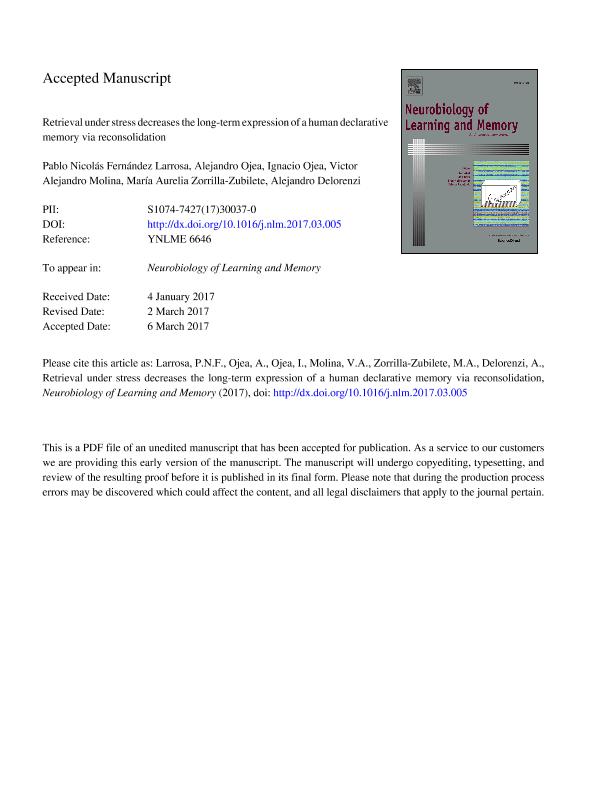Artículo
Retrieval under stress decreases the long-term expression of a human declarative memory via reconsolidation
Fernández Larrosa, Pablo Nicolás ; Ojea, Alejandro
; Ojea, Alejandro ; Ojea, Ignacio
; Ojea, Ignacio ; Molina, Víctor Alejandro
; Molina, Víctor Alejandro ; Zorrilla Zubilete, María Aurelia
; Zorrilla Zubilete, María Aurelia ; Delorenzi, Alejandro
; Delorenzi, Alejandro
 ; Ojea, Alejandro
; Ojea, Alejandro ; Ojea, Ignacio
; Ojea, Ignacio ; Molina, Víctor Alejandro
; Molina, Víctor Alejandro ; Zorrilla Zubilete, María Aurelia
; Zorrilla Zubilete, María Aurelia ; Delorenzi, Alejandro
; Delorenzi, Alejandro
Fecha de publicación:
07/2017
Editorial:
Elsevier
Revista:
Neurobiology of Learning and Memory
ISSN:
1074-7427
Idioma:
Inglés
Tipo de recurso:
Artículo publicado
Clasificación temática:
Resumen
Acute stress impairs memory retrieval of several types of memories. An increase in glucocorticoids, several minutes after stressful events, is described as essential to the impairing retrieval-effects of stressors. Moreover, memory retrieval under stress can have long-term consequences. Through what process does the reactivated memory under stress, despite the disrupting retrieval effects, modify long-term memories? The reconsolidation hypothesis proposes that a previously consolidated memory reactivated by a reminder enters a vulnerability phase (labilization) during which it is transiently sensitive to modulation, followed by a re-stabilization phase. However, previous studies show that the expression of memories during reminder sessions is not a condition to trigger the reconsolidation process since unexpressed memories can be reactivated and labilized. Here we evaluate whether it is possible to reactivate-labilize a memory under the impairing-effects of a mild stressor. We used a paradigm of human declarative memory whose reminder structure allows us to differentiate between a reactivated-labile memory state and a reactivated but non-labile state. Subjects memorized a list of five cue-syllables associated with their respective response-syllables. Seventy-two hours later, results showed that the retrieval of the paired-associate memory was impaired when tested 20 min after a mild stressor (cold pressor stress (CPS)) administration, coincident with cortisol levels increase. Then, we investigated the long-term effects of CPS administration prior to the reminder session. Under conditions where the reminder initiates the reconsolidation process, CPS impaired the long-term memory expression tested 24 h later. In contrast, CPS did not show effects when administered before a reminder session that does not trigger reconsolidation. Results showed that memory reactivation-labilization occurs even when retrieval was impaired. Memory reactivation under stress could hinder -via reconsolidation- the probability of the traces to be expressed in the long term.
Palabras clave:
Memory
,
Reconsolidation
,
Memory Expression
,
Reactivation
,
Retrieval
Archivos asociados
Licencia
Identificadores
Colecciones
Articulos(CEFYBO)
Articulos de CENTRO DE ESTUDIOS FARMACOLOGICOS Y BOTANICOS
Articulos de CENTRO DE ESTUDIOS FARMACOLOGICOS Y BOTANICOS
Articulos(IFEC)
Articulos de INST. DE FARMACOLOGIA EXPERIMENTAL DE CORDOBA
Articulos de INST. DE FARMACOLOGIA EXPERIMENTAL DE CORDOBA
Articulos(IFIBYNE)
Articulos de INST.DE FISIOL., BIOL.MOLECULAR Y NEUROCIENCIAS
Articulos de INST.DE FISIOL., BIOL.MOLECULAR Y NEUROCIENCIAS
Articulos(IMAS)
Articulos de INSTITUTO DE INVESTIGACIONES MATEMATICAS "LUIS A. SANTALO"
Articulos de INSTITUTO DE INVESTIGACIONES MATEMATICAS "LUIS A. SANTALO"
Citación
Fernández Larrosa, Pablo Nicolás; Ojea, Alejandro; Ojea, Ignacio; Molina, Víctor Alejandro; Zorrilla Zubilete, María Aurelia; et al.; Retrieval under stress decreases the long-term expression of a human declarative memory via reconsolidation; Elsevier; Neurobiology of Learning and Memory; 142; Part A; 7-2017; 135-145
Compartir
Altmétricas



